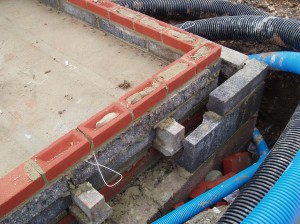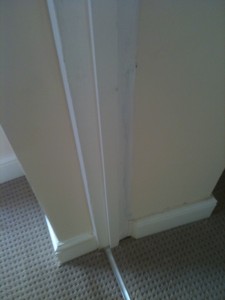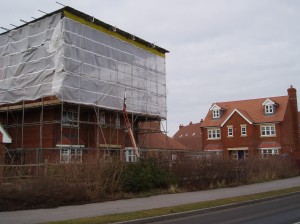The standard and quality of new homes is not improving. Despite surveys and reviews, time and time again, house builders have demonstrated that they only care about profit and numbers. This was recently confirmed to a Taylor Wimpey new home owner last month, when the company’s regional director, visiting because the new home had over 400 faults including potentially dangerous electrical work, said: “we’re here to deliver profit for our shareholders” adding: “we don’t build perfect houses”
Indeed, many disappointed new homebuyers believe they should at least be forced to try to improve the quality of the homes they build! The reality is, it wouldn’t be too difficult to do. If there was a will, there is a way! It certainly would be unlikely to reduce the house builders’ profitability because it always costs less to do the work right first time, than it does to go back over and over again. All a successful business needs is great a product and satisfied customers. The house builders have neither, making their profit predominantly as a result of planning gain, land speculation and on the back of government initiatives such as New Buy and the Help to Buy subsidy!
So below we examine what measures could be implemented through both regulation and changes that any house builder could make to improve quality and customer care.
Government schemes: Any initiative that will help the house building industry, should be conditional on the industry demonstrating it is implementing specific new measures, with the sole aim of improving the quality of new homes built each year.
Consumer protection: There should be greater consumer protection for new home buyers. After all it is possibly the largest purchase anyone will make. At present for example, you have greater consumer protection buying a DVD from Amazon, than you do buying a new house from Persimmon.
 More inspectors and more inspections: There should be different inspectors for building control and warranty inspections. The growing trend for the warranty provider to also carry out the building control inspections has resulted in fewer inspections by fewer inspectors. The NHBC needs to employ at least a third more inspectors to ensure adequate time is allowed for each inspection and that ALL inspections are actually carried out on EVERY new home. The inspectors should be professionally qualified and experienced people and paid a higher salary to attract the best people. The NHBC runs a net cash surplus each year and could easily afford more and better-paid inspectors.
More inspectors and more inspections: There should be different inspectors for building control and warranty inspections. The growing trend for the warranty provider to also carry out the building control inspections has resulted in fewer inspections by fewer inspectors. The NHBC needs to employ at least a third more inspectors to ensure adequate time is allowed for each inspection and that ALL inspections are actually carried out on EVERY new home. The inspectors should be professionally qualified and experienced people and paid a higher salary to attract the best people. The NHBC runs a net cash surplus each year and could easily afford more and better-paid inspectors.
Buyer’s snagging inspectors:  It should be illegal for house builders to refuse purchasers and their inspectors access to the home once it has been second-fixed. All too often, the buyer’s snagging inspector is refused access until after the home has been legally completed. The only possible explanation being either the home is nowhere near finished, or it has been built to such a low standard the builder won’t let an independent professional inspect it until all the money has been received, by then it is often too late. Is there any other purchase where the buyer cannot view and inspect the product before paying for it?
It should be illegal for house builders to refuse purchasers and their inspectors access to the home once it has been second-fixed. All too often, the buyer’s snagging inspector is refused access until after the home has been legally completed. The only possible explanation being either the home is nowhere near finished, or it has been built to such a low standard the builder won’t let an independent professional inspect it until all the money has been received, by then it is often too late. Is there any other purchase where the buyer cannot view and inspect the product before paying for it?
Fully independent consumer surveys: Customer satisfaction surveys should be fully independent of any house builder organisation or trade body. Every new homeowner should be sent a survey, not just selected owner-occupiers. The results for every question for each builder should be made public and a house builders’ league table produced to enable buyers to clearly differentiate the good from the bad and the ugly. The present HBF survey is selective, inconclusive and does not differentiate the better builders from the worst offenders, with all but three of the national plc house builders amazingly being awarded five star ratings!
Build new homes at a steady rate throughout the year: Build releases and stop-start building phases, with an end-of-year panic rush does not lead to good quality construction. House builders will know how many new homes they intend to build in the next twelve months and when they are most likely to be sold. New homes should be built in advance of a sale, not once sold. House building is probably the only industry where a product is contractually sold before it has been created, with buyers forced to complete on the purchase irrespective of the finished quality. Giving trades continuity is also a good way of maintaining and improving quality, as the same tradesmen will be on site for longer and will co-operate better with each other.
Allow more time to build: The NHBC and other warranty providers should stipulate a minimum duration for each stage of the construction and an overall time for a home based on its size and number of floors. For example, one week per 100sqft of floor area. (1600sqft = 16 weeks minimum construction time.) At present, some builders even boast how quickly they can throw up their show homes, often in as little as eight weeks.
Records: House builders should be required to keep a log of all defects notified to them by their customers. From the database, builders should be able to identify and eliminate reoccurring problems in certain house types or designs, operating regions and particular trades or sub contractors.
Building regulations: Review and changes to the Building Regulations should be limited to every five years. There should be no alternative methods of compliance (such as Robust Details) that house builders can use to avoid mandatory testing for sound and air tightness. It is clear that these are abused and that house builders cannot be trusted to self-regulate.
What house builders could do if they cared about improving quality. It is necessary for those in charge of the large house builders to be tough on poor quality and tough on the causes of poor quality. House builders should be ashamed of the poor quality of the homes they build and their often-dire response when customers complain. Both builders and buyers should not just accept, with a degree of inevitability, that every new home would have “teething problems” and “minor faults”. Nearly all snagging defects can be totally rectified and eliminated before a new home is first occupied. It is bad enough that other defects can arise in due course, due to plumbing leaks, shrinkage and drying out. so what else could builders do?
- A change of attitude and direction at the top. The CEOs need to start caring about quality as much as they do about the number of completions, profit and their share price.
- Change the bonus culture. Bonuses should be paid for demonstrable quality not quantity. This should be reflected in the bonuses everyone receives from CEO down to site management.
- CEOs and regional managing directors should visit at least two sites a week, unscheduled and unannounced.
- The CEO should mandate that site managers win at least one NHBC Quality Award for every three sites each regional office is building each year.
- All CEOs need to be better-qualified (University degree) and have site-based knowledge and five years management experience of the house building process, not just an accountancy background.
- Training the future. Every house builder should employ at least two apprentices for every 100 homes they build a year. Apprentices should be paid at least the minimum wage to attract more people and counteract the growing skill shortage.
- Improve quality with better home designs with larger rooms and larger windows. Avoid unconventional construction such as timber frame and reduce the number of elevation treatments and cladding. For many builders it is even a challenge to build a house using the correct bricks and blocks or the even right strength mortar mix!
- Standardised designs and house types. Even a monkey can learn by doing the same thing if it is done many times. Once any teething design issues have been resolved, it should be possible to build the same design over and over again fault free, instead of building different faults in a different designs on every site. Local authority planners should not be able to dictate special one-off designs.
- Offer standardised specification upgrades like those for new cars. L, LX, GL, GLX, Ghia etc. rather than bespoke and expensive optional extras. Everyone building the home would then know exactly what goes into a “LX” home resulting in fewer mistakes, omissions and alterations.
- Site managers should be required to forward detailed snagging lists for each new home to both the builder’s regional and head offices. This would demonstrate the home had actually been properly checked and inspected by the house builder and give all senior management a means of monitoring quality and how thoroughly the homes are being checked at each stage of the building process. Buyers should then be given a copy of all the inspection records at legal completion.
- Better quality begins with better site managers. This is key to improving the quality of new homes. All site managers should be managers with site-based experience and a higher education. No site manager should be in overall charge of a site until he has at least five years site-based management experience. That is not five years experience on site as a carpenter or bricklayer, forklift driver or storeman, but five years assisting and learning from experienced site managers. There is no short cut to being a good, knowledgeable and experienced site manager.
- Site managers should be paid more. All too often the basic salary a site manager receives is not reflected in the responsibility and the work he is expected to do. A site manager is generally responsible for the managing a turnover of around £10million a year on their project. That is more than many businesses!
- House builders should employ fully autonomous quality control inspectors to visit sites and thoroughly inspect “finished” homes before they are legally completed. Their reports, or at least the statistics, should be seen by main board directors and used as a basis to determine the regional director’s pay and bonuses.
- All new home buyers should be given a mobile telephone number for the site manager and his assistant.
- Greater feedback. Site managers should be able to make suggestions for improving quality and customer service, by posting anonymously on an in-house Intranet forum. New home buyers should be able to communicate via a forum hosted on the builder’s website. Passwords could be given to buyers after legal completion to ensure integrity.
- Larger scale developments. Additional costs can be justified on larger sites, such as resident safety inspectors, clerk of works, materials controllers, etc. giving the site manager more time to effectively manage and carefully plan the works. Failing to plan is planning to fail.






